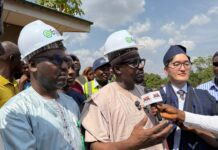By Niyi Jacobs
Top financial experts and development partners have called on Nigerian Pension Fund Administrators (PFAs) to redirect a significant portion of their $15.1 billion assets into climate and infrastructure investments, warning that continued over-reliance on traditional asset classes is limiting both returns and national development potential.
Speaking at a technical workshop in Lagos hosted by FSD Africa, Adebayo Araoye, a senior specialist at the organization, noted that while Africa’s total assets under management are 45 times higher than the continent’s foreign direct investment (FDI) inflows, less than 2% of that capital is being channeled into climate finance and infrastructure—despite the urgency of climate threats and Nigeria’s widening infrastructure deficit.
“This is a massive missed opportunity,” Araoye said. “Domestic capital can be a game-changer for both economic resilience and environmental sustainability, but PFAs must lead that shift.”
The workshop, which attracted board chairs and managing directors from across Nigeria’s pension industry, served as a platform for examining the barriers holding PFAs back from more progressive investment decisions. Currently, the vast majority of pension funds remain locked in low-risk government securities, a strategy increasingly seen as insufficient to deliver optimal returns or support national transformation.
With Nigeria’s pension assets expected to exceed $25 billion by 2030, Araoye said the time to act is now.
The case of Lake Chad was cited as a pressing example of climate-related collapse. Once one of the world’s largest lakes, it has shrunk by 90% over the past 50 years, devastating the livelihoods of millions in the Sahel and fueling insecurity, inter-ethnic conflict, and violent extremism, including Boko Haram insurgency.
“By investing in climate-resilient infrastructure—dams, irrigation, solar grids, smart agriculture—PFAs can help stabilize regions, create jobs, and improve long-term financial returns,” Araoye said.
Jonny Baxter, British Deputy High Commissioner to Nigeria, also stressed the importance of using domestic savings to drive inclusive growth. “There is strong global interest in how Nigeria’s pension sector evolves. The UK is ready to support investment ecosystems that are green, inclusive, and scalable,” Baxter stated.
President of PenOp and CEO of FCMB Pensions, Christopher Bajowa, emphasized that PFAs must now look beyond compliance and embrace strategic innovation. “If we want to future-proof Nigeria’s retirement system, we need to evolve our portfolio strategies. That includes infrastructure and climate-smart investments,” he said.
The event also spotlighted co-investment platforms and institutional alliances as models that could allow PFAs to jointly finance large-scale projects while managing risk. FSD Africa unveiled plans to support such vehicles across Nigeria’s infrastructure pipeline.
“PFAs can’t do it alone, but together, through co-investment and credible platforms, they can fund the future,” Araoye added.
Analysts say that despite regulatory caution and market constraints, the momentum is growing for pension funds in Nigeria—and across Africa—to serve as anchor investors in the continent’s sustainable development drive. The Lagos workshop marks a turning point, shifting the narrative from passive fund safety to active capital deployment.
For now, the message is clear: Nigerian pension funds are sitting on a mountain of untapped power—not just for retirees, but for national progress.














